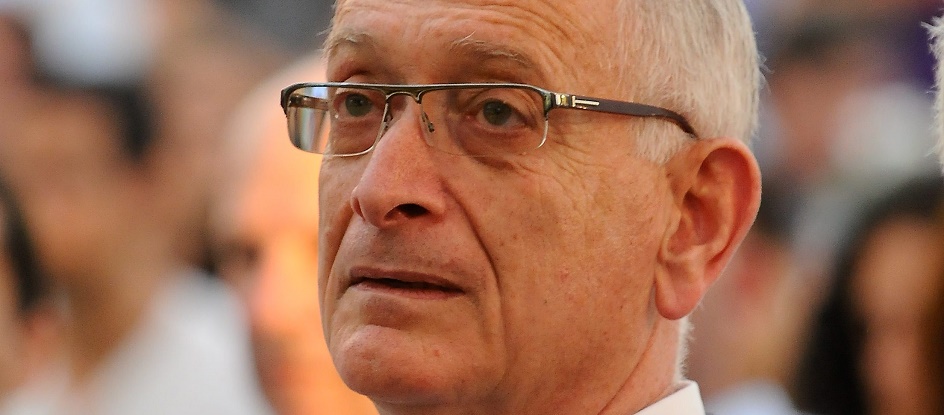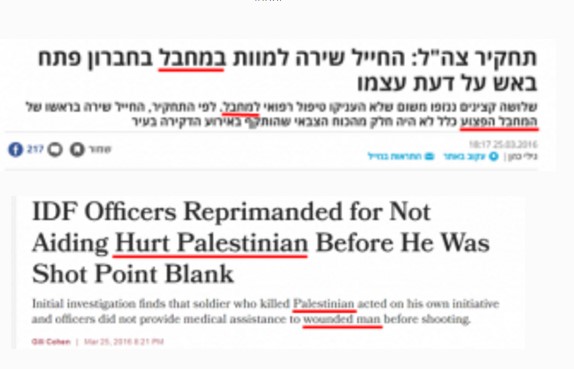Ha’aretz Publisher is deliberately slanting an already anti-Israel newspaper for his English-speaking audience, in directions even his Hebrew paper will not go – or his Israeli audience tolerate.

A storm has been raging on social media in recent days over headlines in the English edition of Ha’aretz. Headlines such as “Yes, Israel is Executing Palestinians Without Trial” and “The Shooting in Hebron Was a Cold-Blooded Execution,” anti-Israel to the point of anti-Semitic, are causing tremendous anger. Ha’aretz’s positions are in any case extreme, but the English edition seems to be deliberately taking even more extreme positions.
This is particularly galling given that Ha’aretz’s English edition has tremendous influence. While only about 5 percent of the Israeli public reads Ha’aretz, for many around the world, the paper’s English edition is the main source of information on events in Israel, or the only source. All the thinking people and the really important people are part of this audience: journalists from all the international media, politicians, government officials, intellectuals, public leaders, and all kinds of other decision makers and tastemakers, who formulate their perspective on Israel and the conflict based on what they read in the paper.
Two incidents that occurred last month brought the disparities in reporting between the Hebrew and English editions of Ha’aretz to a grotesque new peak.
The intensive coverage of the incident in which a soldier shot a wounded terrorist in Hebron has supplied abundant case studies. The differences were evident even in the tags leading to coverage of the incident. While the Hebrew edition wrote about “the shots fired at the wounded terrorist in Hebron,” the tag in English was “Hebron shooting.” No terrorist, no attack, only shooting with no context. This framing was used throughout the coverage. Tal Refael, a researcher for Presspectiva—the Hebrew affiliate of CAMERA, The Committee for Accuracy in Middle East Reporting, which closely follows Ha’aretz’s English edition—counted nine headlines on the issue published concurrently in the Hebrew and English editions. In each of the headlines in Hebrew, the Palestinian who was shot by the soldier was described as a “wounded terrorist,” while in the same news items in English, he was called a “wounded man,” a “prone Palestinian,” a “supine Palestinian,” and other variations of wounded/injured, but not a “terrorist.” Here is an example:
Presspectiva asked Amos Schocken, publisher of Ha’aretz, to explain why the paper has systematically concealed from readers of the English edition the fact that the Palestinian who was shot was a terrorist. In response, he referred us to two news items published in the English edition in which the Palestinian was, in fact, described as an “attacker.” He also added a more comprehensive explanation: “In many cases, the raw information in Hebrew reaches the editorial staff of the Hebrew and English editions at the same time, and then, the English edition translates it, and each edition edits the item separately. The result is that there are differences in both the wording of the item and the headlines.”
Schocken also added a surprising comment, noting that if he has an issue, it is with the editors of the Hebrew edition, who he believes are not sufficiently even-handed in their reporting. “Perhaps the presumption of innocence makes it necessary to be careful about reporting in this way: If they write ‘soldier,’ then they must write ‘Palestinian.’ If we ignore the presumption of innocence and write ‘terrorist,’ then we should write ‘murderer.’”
Another incident provides a rare glimpse of the editing floor and how the process works. The incident involved an item, published at the same time in both editions, about a bill submitted by MK Yoav Kisch, known as the NGO bill, which was meant to restrict the activity of NGOs during election campaigns. The headline in Ha’aretz’s Hebrew edition stated: “Netanyahu Promotes Law to Limit Fundraising by Political NGOs,” a fairly accurate description, which indicates that the bill applied to NGOs from across the political spectrum, both right and left. But this was not the way it was presented in the English edition, where the bill was portrayed as political and one-sided: “Netanyahu Seeks to Limit Left-Wing NGO’s Role in Future Israeli Elections.”
According to the English edition, Netanyahu was seeking to maintain his power by means of a bill that was personal, political, and opportunistic. Anyone fed this information only could not help but object to such a law.
An amusing error in the opening sentences of the item in both editions provides a fascinating peek at the work methods of the translators, who apparently slant the message deliberately to make it more extreme. The first sentence in the Hebrew reads, “Prime Minister Benjamin Netanyahu is seeking to limit the role of right-wing and left-wing NGOs. . . .” In the English edition, the translator’s intentional omission is immediately evident: “Prime Minister Netanyahu is seeking to limit the role of [sic] and left-wing NGO’s. . . .”
In other words, the translator deliberately omitted mention of right-wing NGOs and failed to cover up the incriminating evidence.
Systematic Bias
The fact is that the English edition of Ha’aretz systematically distorts the translation of its news items and tilts them against Israel. Here is a short list from among many dozens of such distortions documented by CAMERA and Presspectiva:
- Ha’aretz in Hebrew: “Muhammad a-Dura, who was shot and killed in Gaza,” and Ha’aretz in English: “Muhammad a-Dura, who was shot and killed by IDF forces in Gaza.”
- When Ha’aretz in English published a photo by Agence France Presse of hunger-striking terrorist Khader Adnan, it omitted the words “a senior member of Islamic Jihad” from the original caption.
- After a riot that ended with soldiers firing at the rioters: In Hebrew, They “Threw Stones,” and in English, They “Marched.”
- In Hebrew, dozens of Palestinians were killed during use of the “Hannibal directive” in Rafah, and in English, “more than 150 Palestinians” were killed.
- In the Hebrew edition, a nun from Syria who was visiting Israel said that a “U.S. Attack on Assad Will Lead to Disaster,” while in the English edition, “Syrian Sister Points Accusing Finger at Israel, U.S.”
There are many and varied further examples, some amusing, which illustrate the systematic distortions in the translations.
Why does this happen?
The numerous examples we have collected over the years, and the fact that the distortion is almost always in one direction—to Israel’s detriment—lead to the conclusion that this is a systematic and deliberate move by officials on the editorial staff. On the other hand, in a large percentage of the cases where we found bias in the translation, the editorial staff of Ha’aretz in English responded to our request and made a correction, evidence of the fact that this is not a declared policy that the paper fully stands behind. Publication of a correction, as anyone in the field knows, is very painful for the paper. The willingness of Ha’aretz’s English-language editorial staff to publish numerous corrections of distortions indicates their sensitivity to criticism and the fact that they perceive every such error as localized.
Amos Schocken is actually angry about the many corrections in the English edition of the paper: “I must say, after examining CAMERA’s report, that I disagree with many of its claims, and if I had been involved in some of the incidents where corrections were made, I would not have agreed to make them.”
He is unmoved by the numerous instances of bias, only a few of which have been reviewed here: “I completely and categorically reject the claim that there is bias in the English edition and excessive criticism of Israel, and all the examples you have collected cannot establish such a claim. CAMERA—and this is an understatement to put it mildly—is a one-sided organization that is focused on a particular goal. It is not some kind of institution whose goal is accuracy in journalism in general. If it were, its findings would be different, and apparently balanced.”
He calls the ambition to create identical headlines in Hebrew and English “artificial,” adding that this would “only make it difficult to read the English.”
Nor is Schocken impressed by the disparagement of Ha’aretz on social networks or by the public criticism. He seeks appreciation for his paper in other areas. This is how he sums up the issue:
“I have no idea what our public status is. Anyone can say what he wants about this.” Schocken notes how Prime Minister Netanyahu reads his paper, telling columnist Moshe Arens: “I read your articles in Haaretz; it’s one of the few times I agree with what’s written in that paper.”
He also notes that President Obama has been generous in his praise of the paper, saying that “Haaretz has never been afraid to speak truth to power,” and that “over the years, I have turned to you as well for your reporting and analysis.” Let this serve as a reminder that there are still those who read it religiously.
Hanan Amior is the editor of Presspectiva, a media criticism website.





